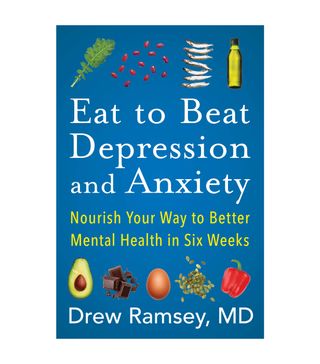I Host a Mental Health Podcast—Here Are 5 Important Things I've Learned From It
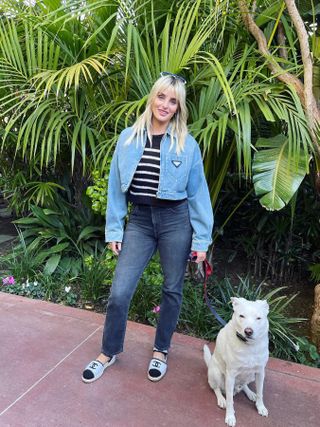
Katie Nehra was planning a mental health podcast for the perfect moment—she just didn't know it The actress and writer had been inspired to create one after realizing there was a need for it in the market. She found the existing ones were too clinical or not helpful or had a host who just wanted to hear themself speak. And as someone who's gone to therapy since she was 5 years old, she felt like she had something to say about the topic. So when she put the wheels in motion in February 2020, little did she know that just a month later, the world would be plunged into a pandemic, causing many people to quarantine at home.
The pandemic forced us to come to terms with a lot of things—one of them being our relationship with mental health. Many people were going through it, but the bittersweet beauty of it all was that people were starting to be more open and vulnerable about their own mental health problems. These struggles were normalized, and many felt less alone hearing about others' similar situations.
So yeah, it was oddly the perfect time for Nehra's new venture. She launched Been Better… HBU? in January 2021 and has featured so many great guests, such as Brooke Shields, Erica Domesek, Kelly Leveque, Bobby Hundreds, and Poppy Jamie. The episodes have covered topics from depression to relationships and dating to ketamine therapy to the connection between nutrition and mental health.
I got a chance to chat with Nehra about her podcast, why she started it, what's next for it, and what she's learned about mental health from hosting. See our conversation below.
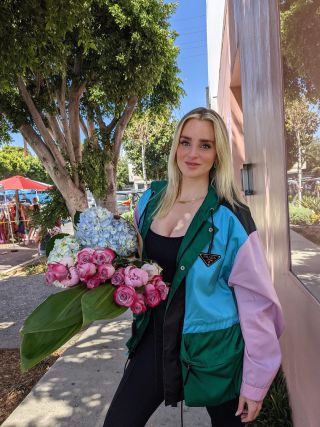
What's your background? And what were you doing before you started the podcast?
I grew up in Baltimore, Maryland, and I went to school in New York for acting. And then I ended up moving to L.A. over 15 years ago. I was going on auditions; I studied at The Groundlings, and it was really there that I learned how to write. And then I was just on the grind of auditioning, driving around town, and writing scripts. I also had a clothing line that began in 2007—and I still will make custom jackets for certain clients, but it just became so much with auditioning and writing and doing a clothing line. So a little before the pandemic, I realized, "Why am I doing this?" I felt as if I was giving blood, sweat, and tears in all these rooms all over town and not receiving anything. And I think especially when everything's taken away, everyone, myself included, looked at themselves and thought, "What am I doing with my life?" It's like, "What is my purpose?" Or "How can I be of service best to everyone and to myself." And then [the podcast] was born from that.
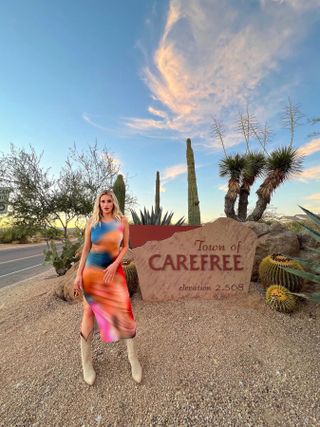
What was your inspiration for the podcast? How did it all come about?
It was in February 2020 right before the pandemic. I had this idea because I found that so many platforms or podcasts I would listen to were incredibly clinical or not helpful, or it was a host just wanting to hear themselves speak. It was a blessing in disguise. Through the pandemic, we were able to really build this great foundation, and people were available to work on this with me. [People] who I don't think would've been available had we not all been in lockdown. And I've personally been in therapy since I was 5, so I'm a bit of an expert on mental illness and manic depression. It's been really rewarding doing this because growing up, I grew up on the East Coast, and it was very different than how I found L.A. or the West Coast is with therapy. There's a lot of shame around therapy, and this was also in the '80s. I think now everybody has a therapist, especially post-COVID.
But at the time when I was growing up, I never wanted to tell any of my friends that I had a therapist, that I was on Ritalin, and that I felt really ashamed. So one of the main goals is to get rid of the shame that people have around mental illness and have it be relatable. So I think people's anxiety, of all ages, is at such a high, and you need to find some sort of an outlet. And that's our goal, hopefully, just to make people feel less alone.
And also something that was important to us was that there's a website, and there's a place where anyone can visit, there are tips and tools, and there's a book that's $5 that we offer. And we're always trying to put promotions, like a 30-day free trial of Sesh, which is an app for therapy—just things that are reachable to everyone. Because I think a lot of times, a lot of wellness platforms, they're giving advice that's like, "It's $2500 to go here this weekend and have crystals laid on you." I'm not sure what that's going to do for your mental health. So I come from a little bit of a different perspective, and that's how it was born and began.
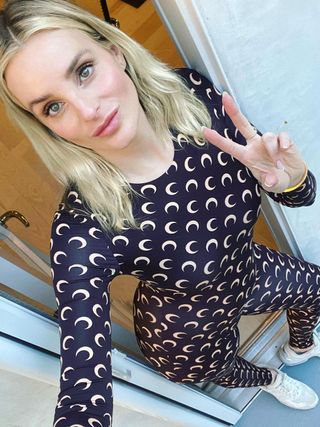
How have you navigated your own mental health journey?
We could be here for like five hours—five years, really. Well, it's been a really long, long journey. As I said, I started therapy when I was 5 because as a child, I was very hyperactive. I just couldn't sit still. And even though my dad is in the business world, his father is an ob-gyn and all his brothers are ob-gyns. And so my family just, in essence, will come from a medical background at things like, "Okay, we need Sierra to see a psychiatrist. Something seems off. Something seems wrong," which is great that they even acknowledge that. Because like I said, and during that time, people kept therapy a secret, and I always felt like, "Oh, I'm this weird kid, and I'm crazy." I had this sort of inner dialogue because I've always had severe OCD. So it was constant obsessive thoughts, intrusive thoughts. And I was lucky enough to eventually find a therapist I like.
But the first therapist I went to, I remember his office was all brown. He wore all brown. I hated him. He just wasn't very welcoming to kids, and I would come in, and I would throw my book bag down and just not speak to him. So I've come a long way from that. But that was my initial inauguration, if you will, into therapy. It took a long time for me to find the right therapist. Some people are luckier. I like to compare it to dating, right? You have to go on a lot of dates to find your husband or girlfriend or significant other. And I think you have to sometimes go through a lot of different therapists to see what works for you.
The therapist that I see in L.A., I've been seeing him for, oh my gosh, is it like six years, maybe seven years? And so he knows me very well. I have therapy twice a week. So that's another thing. I think people make the mistake of saying, "Oh, I'm going to stop therapy. I'm feeling better." And you wouldn't stop going to the dentist (you'd always have your checkup) or stop going to the gym. So you want to exercise your mind in the way you exercise your body. That's how I feel because you don't want things to get worse. And then it's a crash course. I think even if it's just twice a month, once a month, it doesn't have to be once a week or twice a week—what you can afford or get in a group. Just something. I think it's important.
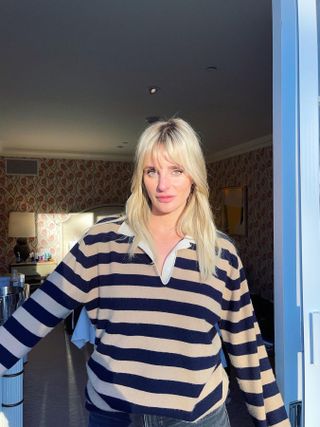
For the first couple of episodes, what did you want to put across?
Well, that's an interesting question. It was Ali [Taekman, Nehra's producing partner] who said, "You should be interviewed because people are going to want to hear your story." So we had [journalist] Jessica Kantor interview me, which was great because it let listeners know who I am. People didn't know me. Or if they did, they just knew my clothing line or acting. [They didn't know,] "Wait, she's depressed?" And I think that's something that Ali and Jessica at the time would talk about. Ali said, "People are so surprised when you say you have manic depression." And they always say, "Oh, you don't seem depressed or you don't look depressed." That's part of the stigma. There are so many people suffering in silence. And just because someone may not look depressed doesn't mean they aren't suffering.
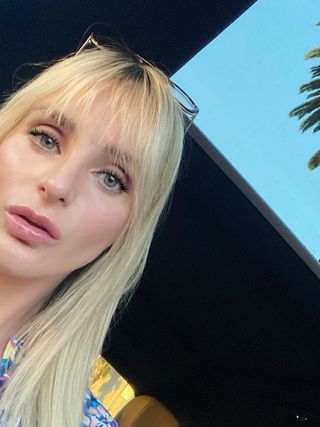
What has surprised you the most about starting the podcast?
I think what surprised me the most is how much I've gotten out of it, where I have started to feel [I'm] really a value and service to people. Where for so long and just being on this audition grind, I started to feel like I had no value, and it really took a toll on my mental health. I like to describe it almost as you know when you see a heartbeat, and it's a line, and it goes like this [moves her hand up and down], right? When you're auditioning, it's like that—it's highs, lows, it's so much adrenaline, then a drop, then nothing, and for me, it just wasn't good. I think that's why a lot of people in the industry, it can be really a mindfuck where you just are constantly up and down, up and down, and you want to get more of just a steady line. And it's given me that stability.
What's the most rewarding thing about doing the podcast?
I think one of the most rewarding, and even surprising, [things] was when we first launched, I would get DMs from people I knew, not really well, but that I knew socially. And they would say, "Thank you so much for this podcast. I have debilitating anxiety." I'd be like, "Oh my God, she does? She's so successful. What is she talking about? She has this clothing line. This person has this." And I was surprised by how many people were really listening. So the reward was a feeling of value and then also learning of how many other people were having the same issues.
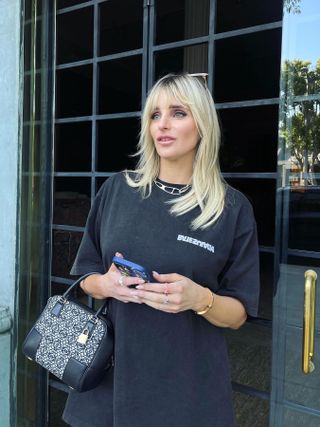
Do you have any dream guests?
There are many, but I would love to have Demi Lovato and Selena Gomez because they have both been so honest and open about their own struggles. And in a very raw way where the industry is so hard on young women about their weight. And I remember, I don't know if it was Demi or Selena who said, "I weigh more because I had to go on meds for my mental health issue. Like get off my back." Like how hard that must be being that well-known and under this microscope and dealing with mental issues. And Selena has started that company where profits—I don't know if it's 10% or not sure on the numbers—go toward mental health. So I think it's really cool that someone of that caliber can come out and say, "I'm really struggling."
And my other one is Brené Brown, who I love. When we were making our mood boards and creating what we wanted to do, I remember when we made our first deck, we had all the quotes from her, and I always go to her as a teacher. She is a huge advocate of "Let's get rid of the shame. We need to get rid of the shame," and how shame thrives in silence. And so that's the other thing—we have to tell people about our mental illnesses and problems and make it as normal as, "I have a cold." Right?
And I thought it'd be fun to chat about the things you've learned about mental health from your podcast.
1. I've learned to acknowledge my own value and knowledge, to not dismiss it or belittle it.
2. To create food for rainbows on plates for breakfast, lunch, and dinner. It’s one of the many great tips in Drew Ramsey's book, Eat to Beat Depression and Anxiety.
3. There's always another day if you're not feeling well. The moment will pass, and when you're really low, this advice is annoying! But it has saved my life.
4. Today, we have many alternatives to "talk therapy" and prescription drugs. I wouldn't be where I am today without either of the above-mentioned. But I want folks to know if you tried one thing and it didn't work, there are alternatives.
5. Laughter can be one of the best forms of medicine.
Subscribe to Been Better... HBU? here.
Next, 12 Things to Try If You Want to Meditate But Don't Know Where to Start
Disclaimer
This article is provided for informational purposes only and is not intended to be used in the place of advice of your physician or other medical professionals. You should always consult with your doctor or healthcare provider first with any health-related questions.
Sarah is lifestyle writer and editor with over 10 years of experience covering health and wellness, interior design, food, beauty, and tech. Born and raised in Los Angeles, she attended New York University and lived in New York for 12 years before returning to L.A. in 2019.
In addition to her work on THE/THIRTY and Who What Wear, she held editor roles at Apartment Therapy, Real Simple, House Beautiful, Elle Decor, and The Bump (sister site of The Knot).
She has a passion for health and wellness, but she especially loves writing about mental health. Her self-care routine consists of five things: a good workout, “me” time on the regular, an intriguing book/podcast/playlist to unwind after a long day, naps, and decorating her home.
-
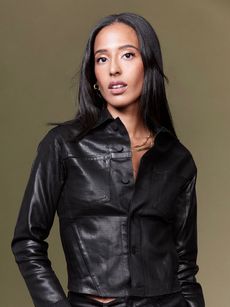 This Founder Shares Why We Should Start Celebrating Rest
This Founder Shares Why We Should Start Celebrating RestBurnout is nothing to be proud of.
By Kia Topps
-
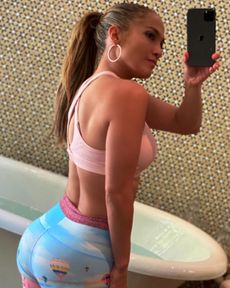 I Asked J.Lo's Trainer for His Very Best Fitness Tips
I Asked J.Lo's Trainer for His Very Best Fitness TipsGunnar Peterson has thoughts on how to get moving this season.
By Kia Topps
-
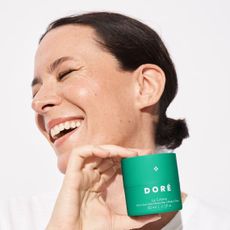 This Style Influencer Turned Founder Shares Her Favorite Ways to Start the Day
This Style Influencer Turned Founder Shares Her Favorite Ways to Start the DayA morning routine from London.
By Candice Aman
-
 Why Dr. Deepika Chopra Believes that Optimism is Resiliency
Why Dr. Deepika Chopra Believes that Optimism is ResiliencyWhy you should start embracing every feeling.
By Kia Topps
-
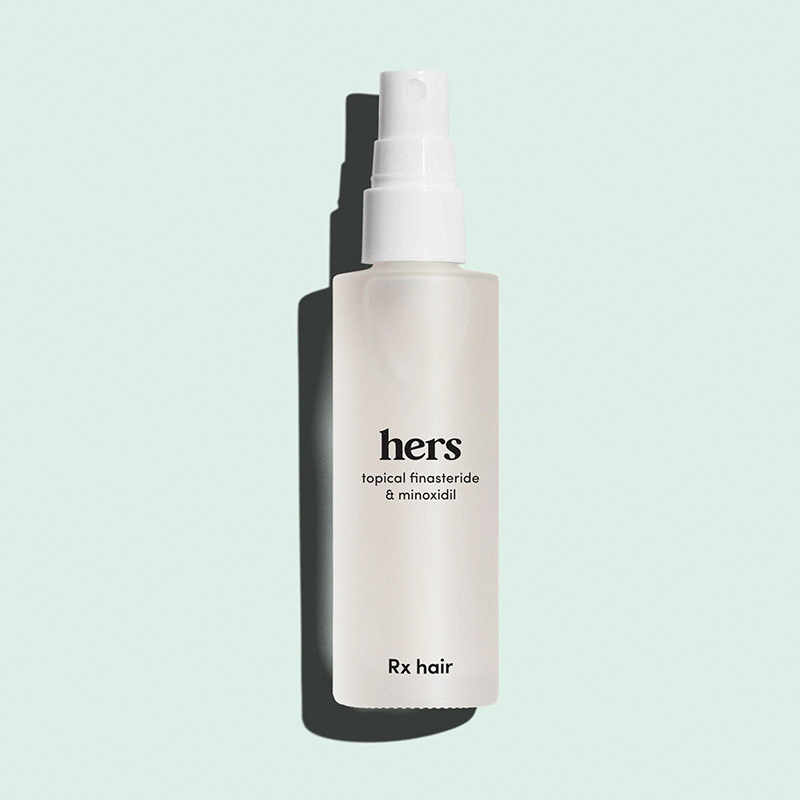 13 Products That Will Step Up Your Self-Care Game From Home
13 Products That Will Step Up Your Self-Care Game From HomeGet that glow from within.
By Natalie Gray Herder
-
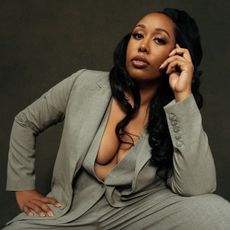 How TikTok's Favorite Photographer Helped Me Find My Confidence
How TikTok's Favorite Photographer Helped Me Find My ConfidenceI renewed my relationship with myself.
By MacKenzie Green
-
 These 8 Foods Are the Worst for Rosacea—Here's What to Eat Instead
These 8 Foods Are the Worst for Rosacea—Here's What to Eat InsteadControl those flare-ups.
By Sarah Yang
-
 11 Things to Do If You're Dealing With Anxiety at Work
11 Things to Do If You're Dealing With Anxiety at WorkThese can help.
By Casey Clark
